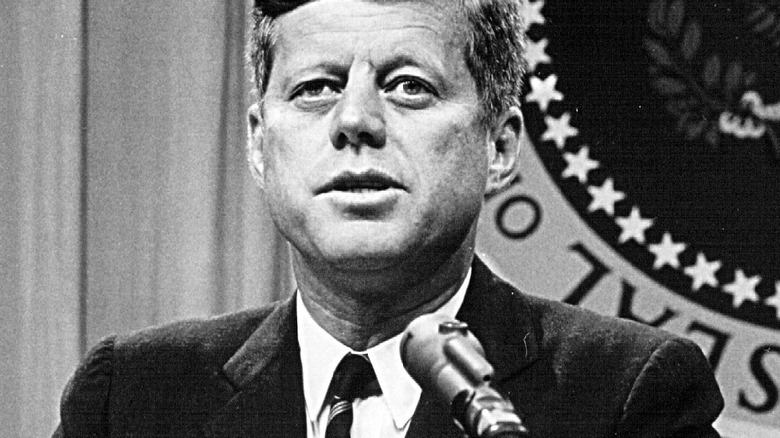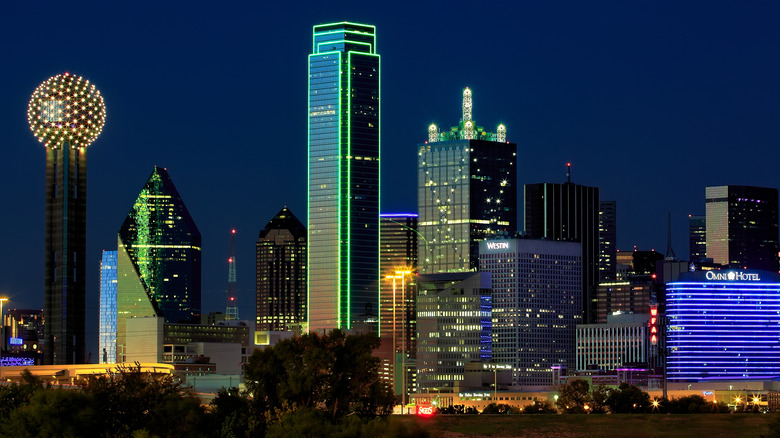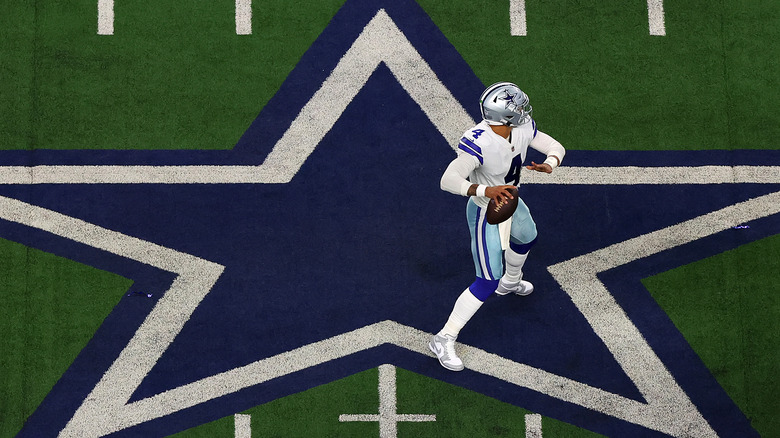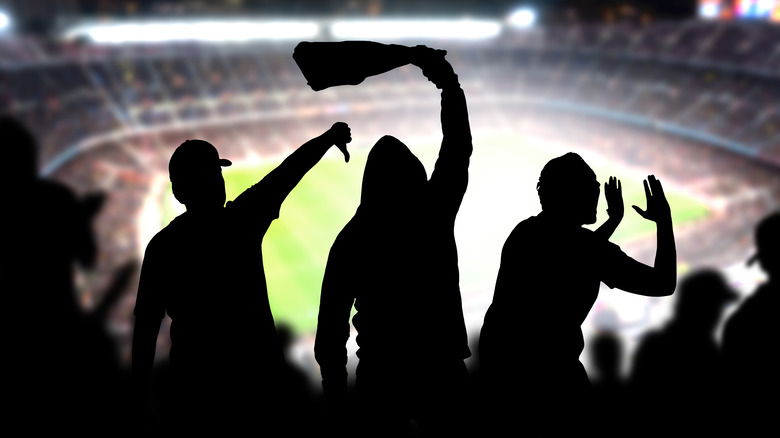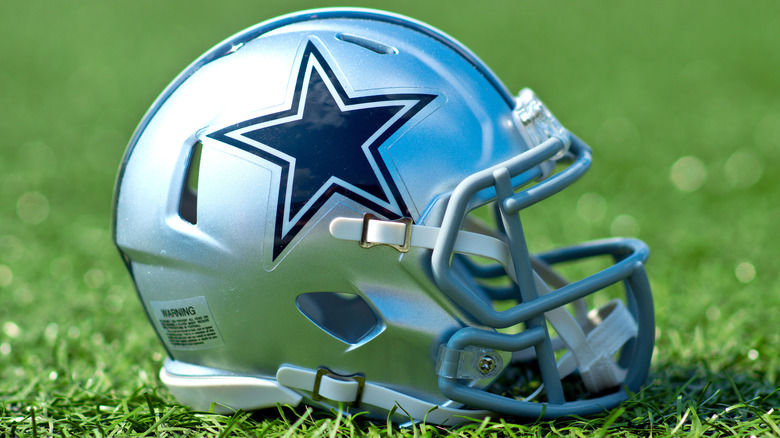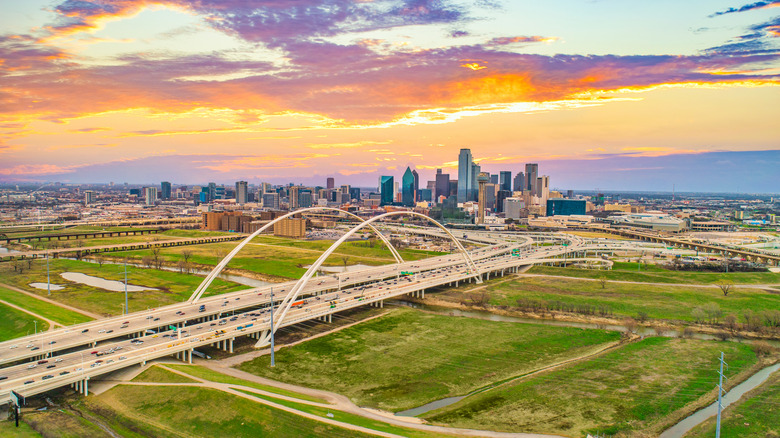Why JFK's Assassination Caused Brutal Backlash For The Dallas Cowboys
John F. Kennedy was the 35th president of the United States and one of four U.S. presidents to have been assassinated. As Britannica explains, Kennedy was assassinated by Lee Harvey Oswald, who was a former Marine. The assassination happened on November 22, 1963, as John and Jackie Kennedy were both in Dallas, Texas, for fundraising. Another reason for this trip had been JFK's attempt at improving the optics of the Democratic Party. Texas was a key state for JFK, and he needed to get support there for reelection. However, these efforts were soon dashed, as JFK was shot and killed while riding in a motorcade through Dealey Plaza.
The aftermath of the assassination rippled throughout the nation. As ABC News says, JFK's death had forever changed American politics, particularly presidential security. The Secret Service itself got a dramatic overhaul to ensure that this would never happen again. Dallas, Texas, too was heavily affected by JFK's death, as many people began to view the city as a hub for extremism, particularly in the case of the Texan far-right (per The Dallas Morning News). This dramatic backlash extended to unlikely targets as well: the Texas football team the Dallas Cowboys.
Dallas' history with far-right extremism
Understanding Dallas' history with far-right extremism is key to understanding why the backlash against the city was so intense. City Journal explains how ultra-conservatism got such an iron grip on the city, much of which resembles modern-day MAGA-mania. President John F. Kennedy was never really welcomed in the city of Dallas, as many people there despised his politics deeply. Kennedy and his running mate, Lyndon B. Johnson, actually ended up winning the Texas vote, but Dallas had never truly budged for their platform. While campaigning in the city, a few people protested the two, with one person even holding up an "LBJ Sold Out to Yankee Socialists" sign.
As author Edward H. Miller says in his book "Nut Country: Right-Wing Dallas and the Birth of the Southern Strategy," Dallas was becoming one of the state's central hubs for extremism in the 50s and 60s. One of the causes for this was the enormous Republican Party support system that formed the backbone of these ideologies. Furthermore, Dallas news publications such as the Dallas Morning News had helped fan the flames of anti-left vigilantes and ideologues.
How the Dallas Cowboys got tangled up with JFK's assassination
The Dallas Cowboys are one of the biggest and most successful football teams in the NFL today. As Britannica says, the team got its start after joining the NFL in 1960 and has since gone on to win numerous Super Bowl championships and host many successful players. It wasn't always like this, however, as the team was once subject to dramatic backlash back in the 60s after President John F. Kennedy's assassination.
As History explains, it only took two days before the football team caught heat from people after the assassination of Kennedy. At the time, the team was playing against the Cleveland Browns in Cleveland in what would have otherwise been a normal football match. Things took a turn for the worse, as the team was booed at during the game. Everyone had viewed the Cowboys the same way they did Lee Harvey Oswald and treated them like they were responsible for the president's death.
The heckling the Dallas Cowboys received was intense
The Cleveland game wouldn't be the last of the hate that the Dallas Cowboys received. As History says, the team was basically reviled across the whole of the United States. The hatred got so bad that even their hotel bellhops treated the team poorly. Employees would not carry their bags and flat-out refused to be hospitable. The Cowboys kept to themselves the entire trip in Ohio and nobody was happy to be there. The game in Ohio apparently had eerily quiet crowds who only looked at the team with contempt.
Crowds had chanted "Dallas go home! Go back to Dallas!" and the announcer was very careful to not use the name Dallas at all. As Cleveland reports, the entire experience was apparently the worst in the history of the Dallas Cowboys. And it wasn't too good for the Browns either, as they were also processing their own grief for the president.
The Dallas Cowboys didn't want to play after the shooting
One this is very clear: Many people did not want to play nor watch football after President John F. Kennedy's death. As Cleveland explains, many fans had stayed home during the Browns v. Cowboys game, 17,000 less than average were in attendance. Many people have argued that the game shouldn't have happened at all, and neither the Browns nor the Cowboys wanted to show up.
According to History, Pete Rozelle, the NFL commissioner at the time, came to regret his decision to schedule seven Sunday football games after JFK's assassination. Bob Lilly, a defensive tackle for the game, said, "I knew we shouldn't be playing today." This sentiment was echoed by other teammates as well, like tight end Lee Folkins who said, "We were concerned about how the game would go and how the fans would receive us." Despite that, the teams played either way, even though the American Football League had canceled every game at the time.
The Cowboys helped clean up Dallas' image
Although things were quite bad for both the city of Dallas and the Dallas Cowboys in terms of image, people eventually began to heal. As The Dallas Morning News explains, Tex Schramm, the manager of the Dallas Cowboys at the time, laid out a comprehensive plan for repairing the team's image. He got to work on numerous TV deals to show the Cowboys off to the country and remind everyone that they're flesh and blood too. There were extravagant halftime shows and exceptionally talented new recruits to the team to further bolster their image. This all took place in the three years following John F. Kennedy's death.
Of course, the Cowboys weren't the only factor in Dallas recovering its reputation, but they did contribute heavily to turning Dallas away from just being the place where JFK died. Successful football seasons from the Cowboys helped put Dallas back on the map. As NPR says, Dallas today is a hotbed of culture and tourism, one that the city worked hard to achieve. And the Dallas Cowboys can at least be thanked for putting that huge first step forward.
